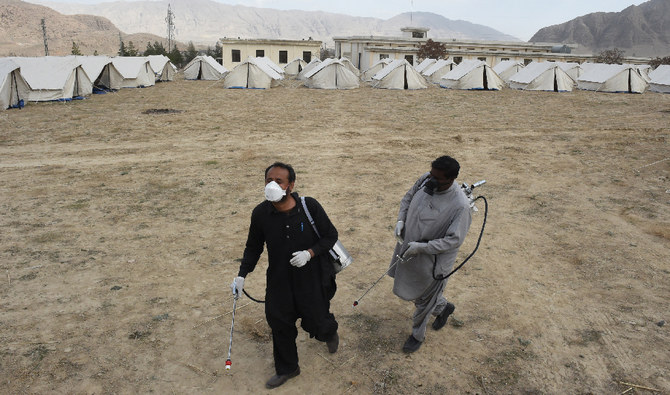KARACHI: Pakistan said its confirmed COVID-19 cases had more than doubled on Tuesday for a second straight day, largely due to errors made in the testing and quarantine of travelers who recently returned from Iran via a land border crossing.
The latest cases take the total tally in Pakistan to 195 and sparked concerns the mistakes could prove costly, as it attempts to control the rapid spread of the disease.
Thousands of Pakistanis, mostly pilgrims, have been put into quarantine in recent weeks at the Taftan border crossing in the western province of Balochistan after returning from Iran, one of the countries worst affected worldwide by the virus.
However, at least 119 of those people who were released have since tested positive after entering other areas of the country, according to officials in other provinces.
“It was not a quarantine, it was a joke, its trickle-down effect is coming down on the entire country. People were not kept there in the right manner,” Murtaza Wahab, a spokesman for the Sindh provincial government, told a local television channel, adding this had spread the virus to the provinces of Sindh and Khyber Pakhtunkhwa.
More than 500 people are still to be transported to Sindh from Taftan, raising fears of a further spike in infections as many are yet to be re-tested. Over 700 more who returned to the province of Punjab on Tuesday are also being tested again, said Punjab’s provincial Health Minister Yasmin Rashid.
Unverified video clips on social media, made by people who were ostensibly quarantined, showed four or five people lodged in a single tent at the border quarantine site.
LYING IN CORRIDOR
Others showed scores of people lying close together on the floor of a single corridor of Pakistan House — a building at Taftan, originally built to house pilgrims who were going to, or returning from Iran.
“Some may not like this, but the fact is arrangements made at Taftan, perhaps instead of betterment caused a large number of patients and infections,” Saeed Ghani, a provincial minister from Sindh told a local television channel.
Pakistan’s top health official, Zafar Mirza, personally visited the Taftan border to review arrangements in February.
“I admit it wasn’t an ideal place to keep people, but there weren’t any choices available,” Mirza said on Monday.
The chief minister of Balochistan, where the border crossing with Iran is located, said the area had housed some 5,000 people who have re-entered Pakistan in recent weeks.
Separately, Punjab’s health minister Rashid denied on Tuesday a report — on the national health ministry’s web portal — of Pakistan’s first coronavirus death, saying a test on a man who had died in a hospital in Lahore had come in negative.
The portal, launched to keep track of the spread of the coronavirus in Pakistan, later reversed the national death count from coronavirus back to zero.
















